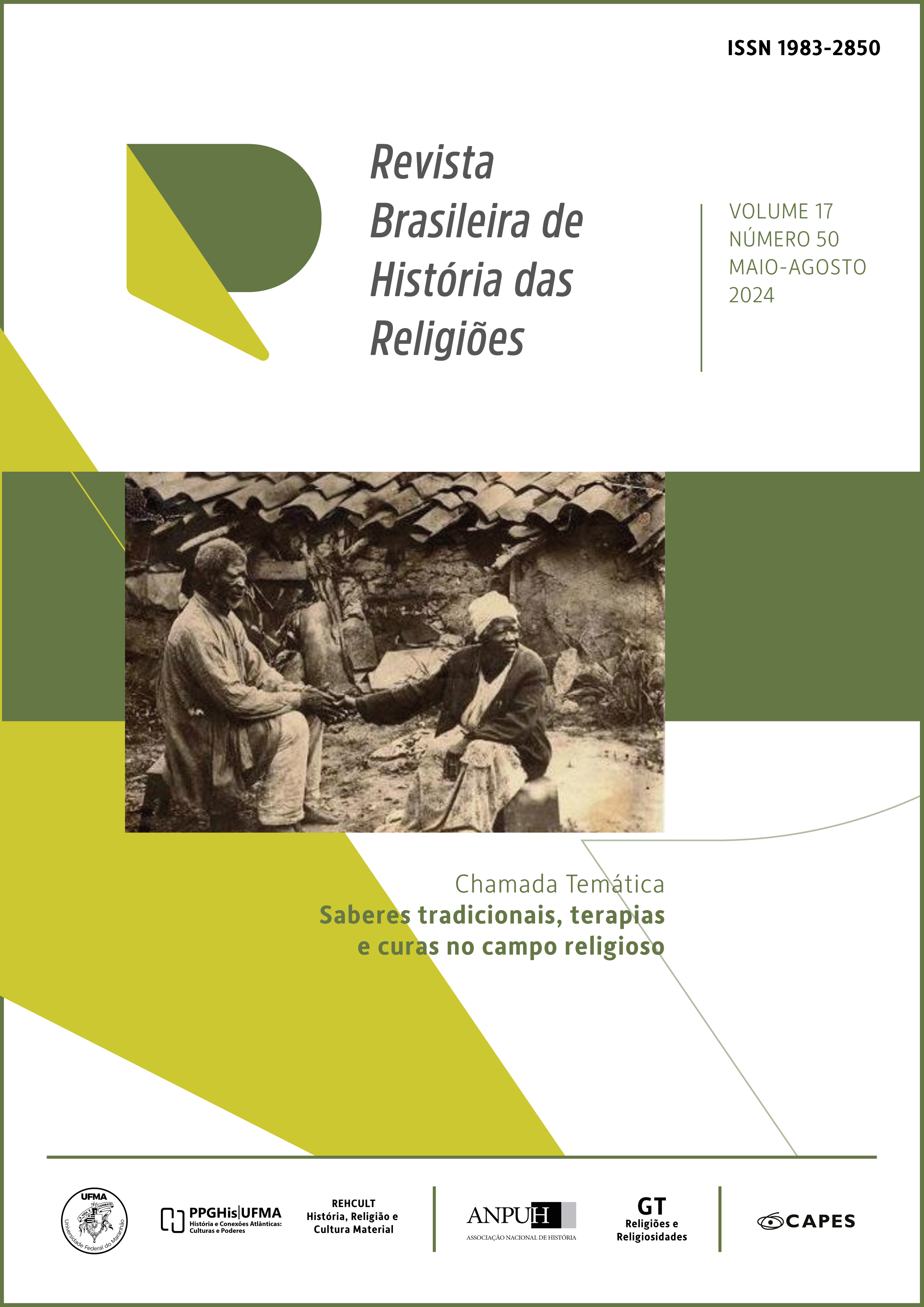Terapias religiosas e o processo saúde-doença no mercado religioso no Haiti
DOI:
https://doi.org/10.18764/1983-2850v17n50.2024.21Palavras-chave:
doença, terapia, Haiti, concorrência religiosa, violência estruturalResumo
Dentre tantos pontos que deixam transparente a vulnerabilidade da sociedade haitiana, as questões que envolvem o processo saúde-doença são os que mais induzem sofrimento e a percepção da desigualdade. Sendo o Haiti o país mais pobre da América e um dos mais pobres do mundo, edificou-se dentro da pluralidade religiosa e terapêutica os
caminhos para tentar alcançar a cura dos processos de adoecimento. A construção do percurso terapêutico dos sujeitos ao perceberem-se doentes, no entanto, além de ser influenciada pela mais profunda precariedade do sistema público de saúde, é permeada por tradições religiosas e a sua visão da etiologia da doença e métodos de cura, e uma série de conflitos religiosos envolvendo os terapias populares locais e as igrejas evangélicas. Frente a esta realidade, aproveitando da ferramentas teóricas da economia religiosa, escolha racional e da segurança existencial, o artigo busca discutir o processo de construção dos itinerários terapêuticos a partir da articulação entre os saberes, os agentes e as práticas envolvidas no processo saúde/doença, levantando questões como a concorrência religiosa no mercado de cura haitiano. Diante de trajetórias apresentadas, percebe-se a violência estrutural como um legado histórico, perpetuado ainda hoje, que inclui as religiões como determinantes do risco de adoecer e da viabilidade (ou não) para curar-se das doenças.
Downloads
Referências
BERGER, P. The Sacred Canopy: Elements of Sociological Theory of Religion, Garden City, NY: Doubleday, 1967.
BELLAH, Robert N. Civil religion in America. In: R Bellah. Beyond Belief: Essays on Religion in a Post-traditionalist World Berkeley: University of California Press.BIRMAN, P. Feitiçarias, territórios e resistências marginais MANA, 2009, 15(2): 1970, pp.321-348. Http://Dx.Doi.Org/10.1590/18094449201500450079
BRODWIN, PL E. Medicine and Morality in Haiti: The Contest for Healing Power. Cambridge University Press, 1996.
BULAMAH, Rodrigo C.Um lugar para os espíritos: os sentidos do movimento desde um povoado haitiano. Dossiê: Corpos, Trajetórias e Valores: perspectivas de gênero, Famílias e reprodução social em contextos africanos. Buenos Aires: CLACSO 2015.
CANNON, W, B. Voodoo Death. In: Lessa, William A. & Voght, Even (eds.) Reader and Comparative Religion: An Anthropological Approach. New York: Harper and Row Publishers, 1972, pp.433-439.
DEREN, M. Divine Horsemen: The Living Gods Of Haiti. New Paltz, NY, 1983.
DURKHEIM, E. Les Formes Élémentaires de la Vie Religieuse, 5e édition, Paris: Quadriage/PUF, 1912.
FARMER, P. Pathologies of Power: Health, Human Rights, and the New War on the Poor. University of California Press 2003.
FARMER, P Mandando doença: feitiçaria, política e mudança nos conceitos da Aids no Haiti rural. In: HOCHMAN, G., and ARMUS, D., orgs. Cuidar, controlar, curar: ensaios históricos sobre saúde e doença na América Latina e Caribe [online]. Rio de Janeiro: Editora FIOCRUZ, 2004. História e Saúde collection, 2004, pp. 534-567.
FREEMAN Bryant C. Third-World Folk Beliefs and Practices: Haitian Medical Anthropology. La Presse Evangélique Port-au-Prince, 1998.
GIODA, Fabiane R.; Grisotti, Marcia A Religiosidade E a Violência Estrutural Como Fatores Influentes No Processo Saúde Enfermidade Atenção Em Uma Comunidade Do Haiti Rural. Métis: História & Cultura, vol. 17, nº 34, 2018.
HANDERSON, Joseph Vodu No Haiti – Candomblé No Brasil: Identidades Culturais E Sistemas Religiosos Como Concepções De Mundo Afro-Latino-Americano. Dissertação. UFP, 2010.
HURBON, L. Dios en el Vodu Haitiano. Buenos Aires: Ediciones Castañeda, 1978.
HURBON, L. O Deus da Resistencia Negra - O vodu Haitiano. Ediçoes Paulinas, são Paulo, 1987.
KLEINMAN, AM. Some Issues for a Comparative Study of Medical Healing. International Journal of Social Psychiatry;19(3-4):1973, pp. 159-165.
KLEINMAN A.Concepts and a model for the comparison of medical systems as cultural systems. Soc Sci Med;12(2B):1978, pp.85-95.
KLEINMAN, A. Patients and Healers in the Context of Culture: An Exploration of the Borderland Between Anthropology, Medicine, and Psychiatry. University of California Press, 1980.
LANGDON, Esther J. Representações de Doença e Itinerário Terapêutico dos Siona da Amazônia. In: SANTOS, Ricardo Ventura; COIMBRA JR., Carlos E. A. (org). Saúde e povos indígenas. Rio de Janeiro: Editora Fiocruz, 1994.
LOYOLA, Maria A. Médicos e curandeiros: conflito social e saúde. São Paulo; DIFEL,1984.
MAUSS, M. Ensaio sobre a dádiva. Forma e razão da troca nas sociedades arcaicas. In : Sociologia e Antropologia. v. II. São Paulo: Edusp, 1923.
MENÉNDEZ, E. L. Sujeitos, Saberes e Estruturas. São Paulo: Hucitec, 2009.
MICHEL, Claudine (2001) El vudú hatiano esun humanismo? Cuyo: Anuario de FilosofíaArgentina y Americana, v 18-19, n. 18, 2001, pp. 23-144.
MOTTA, R. SIUDA-AMBROZIAK, R. The sacrifice, the feast and the power of the priesthood in the Xangô cult of Recife”, Studia Religiologica, vol.51/4, 2018, p. 279-295. https://www.ejournals.eu/Studia-Religiologica/2018/Numer-51-4-2018/art/13636/
NORRIS, P.; INGLEHART, R. Sacred and Secular. Religion and Politics Worldwide. Oxford University Press, 2004.
RABELO, Miriam C. Religião e cura: algumas reflexões sobre a experiência religiosa das classes populares. Cadernos de Saúde Pública, 9 (3), 1993, p. 316-325.
SILVA, V. G. D. Neopentecostalismo e religiões afro-brasileiras: Significados do ataque aos símbolos da herança religiosa africana no Brasil contemporâneo. Mana, 13(1), 2007, pp. 207-236.
SIUDA-AMBROZIAK, R. Jumping into faith - the Phenomenon of Brazilian Pentecostal Conversions, Studia Religiologica, vol. 51, nr. 1, 2018a, p. 11-32. https://www.ejournals.eu/Studia-Religiologica/2018/Numer-51-1-2018/art/12994/
SIUDA-AMBROZIAK, R. Health and wealth in contemporary Brazilian religious culture”, Przegląd Religioznawczy, nr. 4(270), 2018b, p. 31-48. https://journal.ptr.edu.pl/index.php/ptr/article/view/69/62
SIUDA-AMBROZIAK,, R. Benzedeiras em vias de extinção na Ilha da Magia, Metis: História e Cultura, vol. 17, nr. 34, 2018c, p. 125-146. http://www.ucs.br/etc/revistas/index.php/metis/article/view/6941
SIUDA-AMBROZIAK, R. Benzedeiras: lights and shadows of the religious healing practice in Brazilian folk Catholicism, Studia Religiologica, vol. 52, nr. 3, 2019, p. 191- 204. https://www.ejournals.eu/Studia-Religiologica/2019/Numer-52-3-2019/art/15301/
Siuda-Ambroziak, R. Tankowanie axé, czyli religijna terapia w afro-brazylijskim candomblé, Studia Religiologica, vol. 53, nr. 4, 2020, p. 333-346. https://www.ejournals.eu/Studia-Religiologica/2020/Numer-53-4-2020/art/18051/
STARK, R.; BAINBRIDGE, W.S Uma teoria da religião, Paulinas, São Paulo, 2009.
VONARX, N. Le Vodou haïtien comme système de soins, nouvelle lecture. In: J. Hainard, P. Mathez & O. Schinz (eds.). Vodou (pp. 177-197), Geneva: Infolio, Musée d‘ethnographie de Genève, 2008.
Downloads
Publicado
Como Citar
Edição
Seção
Licença
Copyright (c) 2024 Revista Brasileira de História das Religiões

Esta obra está licenciado com uma Licença Creative Commons Attribution 3.0 Unported License.













